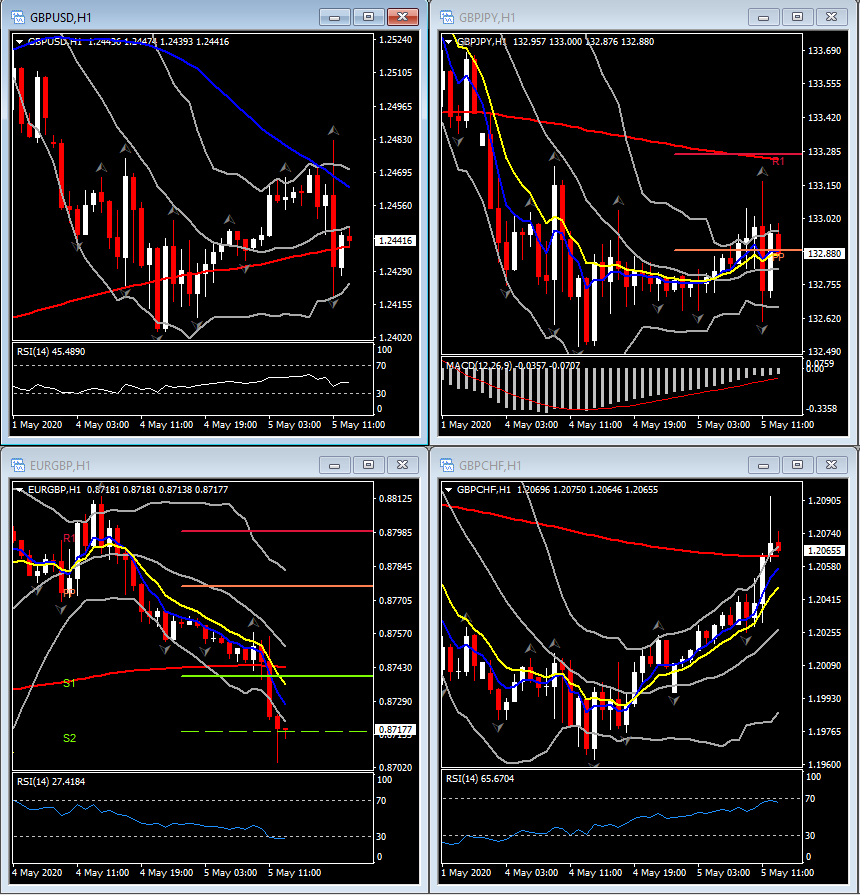With RBA out of the way, BoE is the next to announce monetary policy this week. The BoE’s May monetary policy will be accompanied by its quarterly Inflation Report. The central bank has already slashed its policy repo interest rate to near zero while expanding its QE programme and putting in liquidity measures in response to the financial market consequences of the pandemic-forced economic lockdown. As with the Fed and ECB last week, this policy meeting isn’t likely to be too eventful, with the policy framework expected to be left unchanged for now. Large reductions in the central bank’s growth and inflation forecasts can taken as a given in the Inflation Report.
Meanwhile, a more eventful announcement, will be the looming decision on the UK’s lockdown, with the government announcing its review on it this Thursday. Although the five criteria the government has listed as necessary to be met before a phased reopening can commence:
- flattening in the infection rate
- ability of the health system to cope, with increased diagnostic testing capacity
- a sustained and consistent fall in daily death rates with confidence the UK is beyond the peak
- enough testing and personal protective equipment (PPE) to meet future demand
- that any changes in restrictions will not lead to a second peak
look to be nearing accomplishment, Prime Minister Johnson will reportedly extend the lockdown for a third time, although for how long is uncertain. He will also, reportedly, detail a roadmap to economic reopening in the UK.
And adding to the uncertainties over the extent of the economic recession in the UK are also the weak data reports, with the latest being the UK final April composite PMI. The UK’s final composite PMI was unexpectedly revised higher, to a reading of 13.8 from the preliminary estimate of 12.9. However this won’t be greeted with joy as the revised outcome still marks a record low (by far) since the series started in 1998, having plunged from 36.0 in March, and from a reading above 50.0 in February.
The details of the survey reveal record declines in new work and employment, while input costs in the service sector dropped for the first time in the data series. As has been seen in other countries, the service sector drop was eye watering, diving to 13.4 (revised from 12.3) from 34.5 in March, with April being the first month of data to fully capture the true impact of the coronavirus/lockdown.
The data reflects the wide extent of business mothballing due to the pandemic and consequent lockdown, which commenced in the UK on March 23rd. In the manufacturing realm, the small minority of businesses reporting output growth were involved in medical supply chains or producers of food or drink. Many sub-components fell by record amounts, but while staffing levels dropped there were numerous reports that the fall reflected the use of the government scheme to furlough workers. One ray of light came from business optimism for the year ahead, which lifted off its record low that was seen in March, although only modestly, reflecting expectations for a phased reopening of the economy.
In the FX market:
Sterling is trading mixed so far today, dropping against a generally firmer Dollar while gaining versus an underperforming Euro, and holding steady against the Yen. Cable posted an intraday low at 1.2421 after tumbling back from the intraday high at 1.2461. In contrast, euro weakness drove EURGBP over 0.5% lower, to a four-day low at 0.8708. The release of final UK PMI survey data was of no consequence.
In the overall picture however, Sterling remains under pressure against USD which has been extending gains against EUR since last Friday. While the Pound is up by over 8% from the 35-year low that was seen in mid March, the currency remains down by over 6% on the year-to-date.
The UK currency has today once again proved sensitive to the backdrop of falling global stock markets. The combo of the UK’s open economy, current account deficit and outsized financial sector, has made Sterling sensitive to swings in risk appetite in global markets.
If we turn our attention to Cable, the pair is stuck in between the 61.8% and 50.0% Fibonacci retracement of the down leg from 1.3199 to 1.1409, while it is trading for a second day at the mid-Bollinger Band line. The rejection of the 200-day SMA at 1.2643 for a 2nd time reflects the significance of this strong resistance level, while it kept the asset into more than a month range below 1.2600.
To the downside, the 50% Fibo at 1.2300 could be a key level for a potential reversal of a trend lower. Currently, however, the nearterm picture is negative while overall picture is neutral with momentum indicators (RSI at 51, MACD flattened at zero) and BB lines and daily moving averages flattened, suggesting that consolidations could continue in the upcoming days.
Click here to access the HotForex Economic Calendar
Andria Pichidi
Market Analyst
Disclaimer: This material is provided as a general marketing communication for information purposes only and does not constitute an independent investment research. Nothing in this communication contains, or should be considered as containing, an investment advice or an investment recommendation or a solicitation for the purpose of buying or selling of any financial instrument. All information provided is gathered from reputable sources and any information containing an indication of past performance is not a guarantee or reliable indicator of future performance. Users acknowledge that any investment in Leveraged Products is characterized by a certain degree of uncertainty and that any investment of this nature involves a high level of risk for which the users are solely responsible and liable. We assume no liability for any loss arising from any investment made based on the information provided in this communication. This communication must not be reproduced or further distributed without our prior written permission.




















